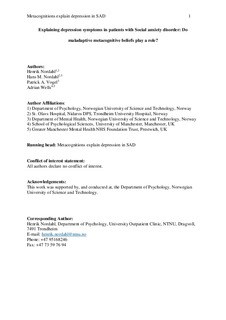| dc.contributor.author | Nordahl, Henrik | |
| dc.contributor.author | Nordahl, Hans Morten | |
| dc.contributor.author | Vogel, Patrick A. | |
| dc.contributor.author | Wells, Adrian | |
| dc.date.accessioned | 2019-05-08T07:10:06Z | |
| dc.date.available | 2019-05-08T07:10:06Z | |
| dc.date.created | 2018-03-05T09:21:29Z | |
| dc.date.issued | 2018 | |
| dc.identifier.citation | Clinical Psychology and Psychotherapy. 2018, 25 (3), 457-464. | nb_NO |
| dc.identifier.issn | 1063-3995 | |
| dc.identifier.uri | http://hdl.handle.net/11250/2596892 | |
| dc.description.abstract | Social anxiety disorder (SAD) is a major risk factor for developing symptoms of depression. Severity of social anxiety has previously been identified as a risk factor, and cognitive models emphasize dysfunctional schemas and self‐processing as the key vulnerability factors underlying general distress in SAD. However, in the metacognitive model, depressive and other symptoms are related to metacognitive beliefs. The aim of this study was therefore to test the relative contribution of metacognitions when controlling for SAD severity and factors postulated in cognitive models. In a cross‐sectional design, 102 patients diagnosed with primary SAD were included. We found that negative metacognitive beliefs concerning uncontrollability and danger and low confidence in memory emerged as the only factors explaining depressive symptoms in the regression model, suggesting that metacognitive beliefs are associated with increased depressive symptoms in SAD patients. | nb_NO |
| dc.language.iso | eng | nb_NO |
| dc.publisher | Wiley | nb_NO |
| dc.title | Explaining depression symptoms in patients with social anxiety disorder: Do maladaptive metacognitive beliefs play a role? | nb_NO |
| dc.title.alternative | Explaining depression symptoms in patients with social anxiety disorder: Do maladaptive metacognitive beliefs play a role? | nb_NO |
| dc.type | Journal article | nb_NO |
| dc.type | Peer reviewed | nb_NO |
| dc.description.version | acceptedVersion | nb_NO |
| dc.source.pagenumber | 457-464 | nb_NO |
| dc.source.volume | 25 | nb_NO |
| dc.source.journal | Clinical Psychology and Psychotherapy | nb_NO |
| dc.source.issue | 3 | nb_NO |
| dc.identifier.doi | 10.1002/cpp.2181 | |
| dc.identifier.cristin | 1570385 | |
| dc.description.localcode | Locked until 28.02.2019 due to copyright restrictions. This is the peer reviewed version of an article, which has been published in final form at [10.1002/cpp.2181]. This article may be used for non-commercial purposes in accordance with Wiley Terms and Conditions for Self-Archiving. | nb_NO |
| cristin.unitcode | 194,67,40,0 | |
| cristin.unitcode | 194,65,35,0 | |
| cristin.unitname | Institutt for psykologi | |
| cristin.unitname | Institutt for psykisk helse | |
| cristin.ispublished | true | |
| cristin.fulltext | original | |
| cristin.qualitycode | 1 | |
